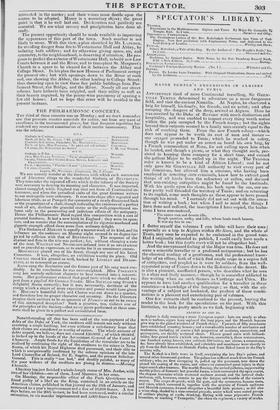THE PHILHARMONIC CONCERTS.
Tnt third of these concerts was on Monday ; and we don't remember one that presents scantier materials for notice, not from any want of excellence in the instrumental pieces, but that frequent repetition has rendered any renewed examination of their merits unnecessary. This was the scheme.
ACT I.
Sinfonia in C minor Recd. ed Aria, Mr. Sant), "Alt perfida"
Concerto in G minor, Pianoforte, Mr. Moscur:i.s.s Be it. ed Aria, Miss Po.VTANS, " Se pieta net col serbate." Cv:rture. Der Behermeher der Garter
ACT IL Sinfonia in E tlat MOZART.
..Ara, Miss CLARA NOVELLO, " aband '" Scotia. io mta, Violoncello e Contra Basso, Messrs. Lt or.Ev and
BRAGONETTI CORELL%
Te it. ■• Quartetto, " il mar" (hilmicketi) Moz.vivr. C v -rture, Jessonda Smon K.
Leader, Mr. Wricusgt.–Conductor, Mr. 'I'. COOKE.
We can scarcely wonder at the fondness with which each successive set of Directors clings to the wonderful Sinfonia of BEETHOVEN. They remember the repeated efforts which in the infancy of the Society were necessary to develop its meaning and character. It was imported, almost smuggled, while England was shut out from all Continental in- tercourse, and when the periodical visits of the great German writers to our metropolis were unknown. It rose into shape after repeated and laborious trials, as at Pompeii the symmetry of a newly discovered limb or the proportions of a shaft, though indicating the existence of a perfect work of art, disclose the graceful statue or the well-proportioned co- lumn only to the persevering and judicious efforts of the antiquary. Hence the Philharmonic Band regard this composition with a sort of parental fondness. It had a new birth in England : they were its spon- sors, and no wonder that the contemplation of its vigorous manhood and gigantic strength afford them more than ordinary delight. The Sinfonia of MozART is equally a master work of its kind, and its influence on the audience on Monday night seemed in no degree im- pa'red by collision with that of BEETHOVEN. The response of the clarinet and flute in the trio was perfect ; for, without changing a note of the text, WILLMAN and Nrclioi.sost infused into it so sweet a tone and so graceful an expression, as to excite for it an unanimous encore.
MoscritmEs played one of his finest, though not one of his latest Concertos. It was, altogether, an exhibition worthy its place. Old
Coartu stood his ground so well, backed by LINDLEY and Mace- NETTI, as to command an encore.
&trio sung the Recitative and the former part of his song most cre- ditably. In its conclusion he was over-weighted. Miss POSTANS'S song has scarcely sufficient character to bear removal into a concert- room. Her performance evinced that good taste whicla we should ex- pect from a pupil of Sir GEORGE SMART. Miss Norm.° sung Srollu's delightful Scena correctly; but it was, necessarily, destitute of the energy which a singer of more experience and power would have given it. MOZART'S beautiful Solo and Chorus was cut down to a quartet, and therefore lost its proper character and meaning. Do the Directors imagine their auditors to be so ignorant of Idomenco as not to be aware of this attempted deception? Such a practice, too, violates one of
the principles of the Society—that every piece performed at these con- certs shall be given in a perfect and untinitilated form. BEETHOrml. BEETHOVEN. MO3CHFLES. CIMARDSA. C. M. VON WEBER.


























 Previous page
Previous page